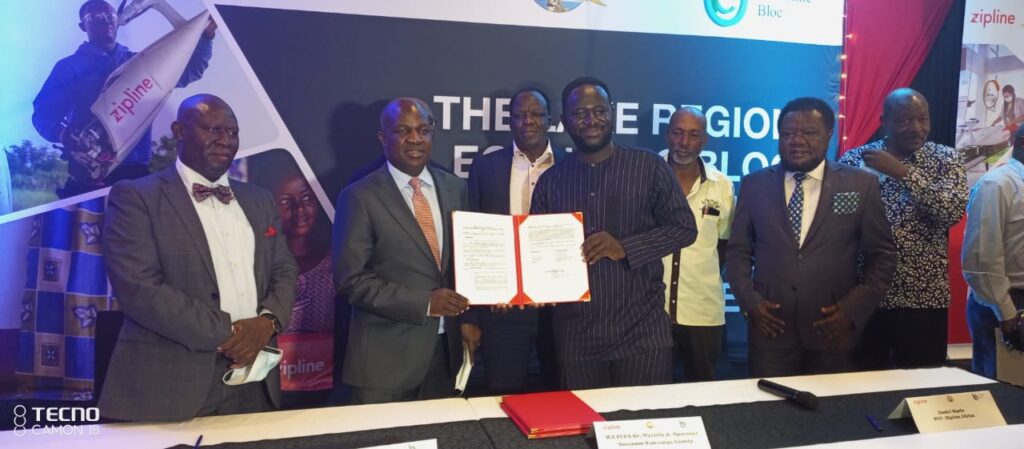Lake Region Economic Bloc (Lreb) counties have come closer to finding a lasting solution to delays in delivery of medical supplies following the introduction of drone technology.
The technology to be provided by an American digital supply chain firm, Zipline Technology will use drones to deliver medical supplies to over 1, 250 health facilities within the 14 counties.
Zipline Senior Vice President Daniel Marfo and Kisumu County Deputy Governor Dr Mathews Owili on February 16, signed a Memorandum of Understanding for the piloting of the project in Kisumu.
According to Mr Marfo, the technology which was initiated in 2016 in Ghana has proven viable, and has since been replicated in Ghana, Nigeria, and Ivory Coast.
“Our focus is to have instant and scheduled distribution, wherehousing and data systems to help in decision making,” said Marfo.
Sh1.5 billion wherehouse
Zipline is expected to construct a Sh1.5 billion medical supplies wharehouse in Kisumu, from where the drone station will also be hosted.
And with Kenya Medical Supplies Agency (Kemsa) being the sole supplier of medical products to the counties, the supplies targeting the 14 lake region counties will be expected to be delivered to the Zipline wherehouse in Kisumu.
From here, Zipline will then ensure delivery of the supplies to all the health facilities upon requests.
The facilities will be expected to book an order with Zipline.
“Our team will be able to coordinate with the facilities, take their orders, brief the facilities on the progress of the deliveries, pack the orders, and deliver through the drones within 45 minutes,” said Marfo.
He noted that to ensure smooth operation, the firm will develop the ordering system which responds to the needs of the health facilities.
He said the firm has since received approvals from the Ministry of Defense, and are in the process of seeking approvals from the Kenya Civil Aviation Authority.

Medical supplies challenges
Once fully implemented, the technology is expected to beat the challenges that come with delays in delivery of drugs due to bureaucracies, and poor access in some areas.
The technology will also save the health facilities the losses which come with expiry of drugs, as they will only order what they need at every particular time.
Dr Owili said access has been one key challenge, especially in the rural areas.
“This concept is amazing. The current supply chain is mechanical, people-centred and human resource intensive. This is a true definition of cost-benefit analysis,” he said.
Lake Region Economic Bloc Chair and Kakamega Governor Wyckliffe Oparanya said the technology is the answer to the demands of the 2010 Constitution which focuses on service delivery.
“We have over 14 million people in the bloc, and health is one of the sectors that is more devolved and has more challenges. We would wish to support this initiative and have it upscaled to Agriculture,” he said.
Data from Zipline indicates that the firm has managed to make 200, 000 deliveries since 2016, and managed to deliver five million Covid-19 vaccine doses, 120, 000 blood units, and another 900, 000 medical products in Rwanda and Ghana.
